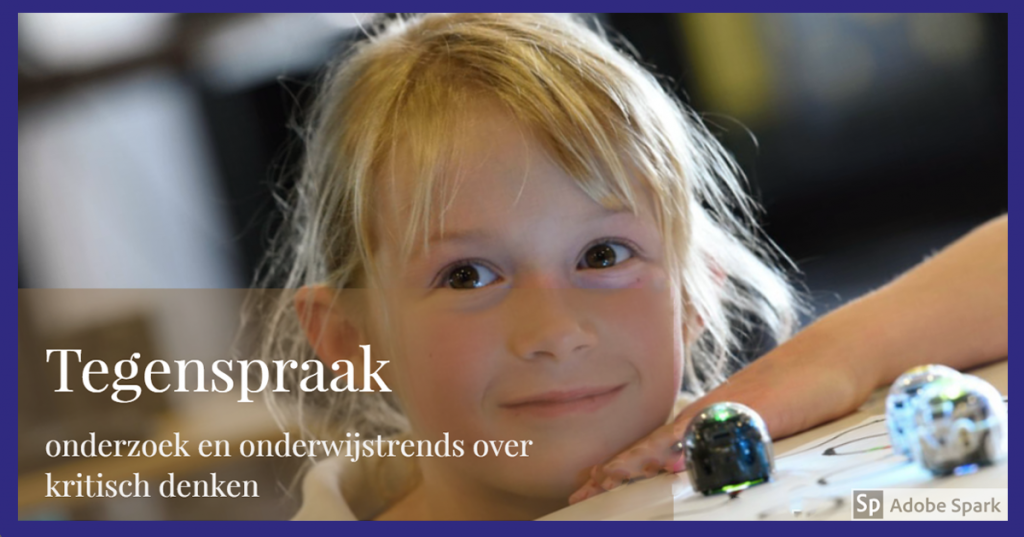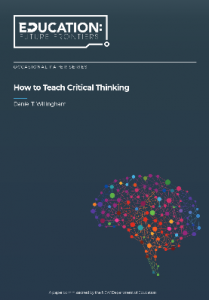
Kritisch denken wordt als een belangrijke competentie aangestipt in onderwijs en samenleving. Een vaardigheid die aan belang wint in de 21ste eeuw met artificiële intelligentie, geavanceerde technologie en machines en algoritmen die manuele en repetitieve arbeid vervangen.
Onderzoek brengt onder de aandacht dat kritisch denken geen generieke vaardigheid is die kan aangeleerd worden, net zoals logisch denken. Lespakketten, oefeningen en games brengen voor kritisch denken geen duurzame leerresultaten tot stand. In de onderzoeksliteratuur wordt aangetoond dat kritisch denken geleerd in vak A moeilijk transfereerbaar is naar vak B. Analyseren, synthetiseren en evalueren betekent iets anders in verschillende disciplines. Daniel Willingham (2019), prof. psychologie aan de universiteit van Virginia, concludeerde dat vakkennis cruciaal is voor effectief kritisch denken. Onderwijs kan beter opnieuw de focus leggen op curricula die vakinhoud versterken.
 Willingham concludes that scientists are united in their belief that content knowledge is crucial to effective critical thinking. Scientists are somewhat divided as to whether critical thinking is best characterised as a large number of more specific skills or a smaller number of more generic skills. The author argues that the latter is not a fruitful way to conceptualise skills in education, however, as there is little theory to guide how to teach generic skills. The author recommends a four-step process to develop a program to teach critical thinking: (1) identify a list of critical thinking skills for each subject domain; (2) identify subject matter content for each domain; (3) plan the sequence in which knowledge and skills should be taught; (4) plan which knowledge and skills should be revisited across years.
Willingham concludes that scientists are united in their belief that content knowledge is crucial to effective critical thinking. Scientists are somewhat divided as to whether critical thinking is best characterised as a large number of more specific skills or a smaller number of more generic skills. The author argues that the latter is not a fruitful way to conceptualise skills in education, however, as there is little theory to guide how to teach generic skills. The author recommends a four-step process to develop a program to teach critical thinking: (1) identify a list of critical thinking skills for each subject domain; (2) identify subject matter content for each domain; (3) plan the sequence in which knowledge and skills should be taught; (4) plan which knowledge and skills should be revisited across years.
Ook onderwijsjournaliste Nathalie Wexter (2019) neemt dit standpunt in met haar boek ‘The knowledge gap’.
It was only after years within the education reform movement that Natalie Wexler stumbled across a hidden explanation for our country’s frustrating lack of progress when it comes to providing every child with a quality education. The problem wasn’t one of the usual scapegoats: lazy teachers, shoddy facilities, lack of accountability. It was something no one was talking about: the elementary school curriculum’s intense focus on decontextualized reading comprehension “skills” at the expense of actual knowledge.
The Knowledge Gap isn’t just a story of what schools have gotten so wrong–it also follows innovative educators who are in the process of shedding their deeply ingrained habits, and describes the rewards that have come along: students who are not only excited to learn but are also acquiring the knowledge and vocabulary that will enable them to succeed. If we truly want to fix our education system and unlock the potential of our neediest children, we have no choice but to pay attention.